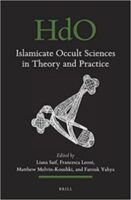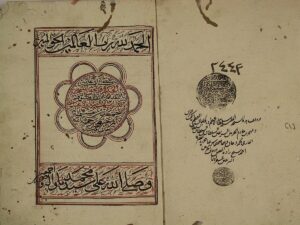Home » Research » Current research projects » Research: Dr. Liana Saif

Dr. Liana Saif is a historian focused on Islamic esotericism and the occult sciences in the medieval period (eighth to the thirteenth century). She has recently co-edited the highly anticipated volume Islamicate Occult Sciences: Theory and Practice, with Francesca Leoni, Farouk Yahya and Matthew Melvin-Koushki, (Leiden: Brill, 2021). She also pays special attention to intercultural exchange of esoteric and occult ideas between the Islamicate and Latinate worlds all the way to the European Renaissance, as reflected in her first monograph “The Arabic Influences on Early Modern Occult Philosophy” published by Palgrave Macmillan in 2015. She explores there the Islamic scientific and natural-philosophical foundations of the theories of astral influences that “naturalised” astrology and astral magic, becoming sciences that explore the dynamics that link the terrestrial and celestial worlds, thus co-producing knowledge about nature and the cosmos, and resulting in a universe more intelligible to both Muslim scientists and philosophers, and their European counterparts.

Saif has published on the intersection of medicine and the occult sciences and worked extensively on the tenth-century esoteric and underground Brethren of Purity (Ikhwān al-Ṣafāʾ) and their encyclopaedic Epistles (Rasāʾil). She is currently preparing a long-awaited critical translation from Arabic into English of Maslama b. Qāsim al-Qurṭubī’s (d. 964) Ghāyat al-ḥakīm, known in its Latin translation as the Picatrix. More recently, she has been conducting research on the understudied, yet influential, ninth-century corpus known as the Pseudo-Aristotelian Hermetica. The first outcome of this undertaking is an open-access research paper entitled “Preliminary Study of the Pseudo-Aristotelian Hermetica: Texts, Context, and Doctrines”, in Al-ʿUsur al-Wusta: The Journal of Middle East Medievalists, Volume 29 (2021). The objective is to build a project to study this corpus further, in addition to editing and translating it.

Dr. Liana Saif is a historian focused on Islamic esotericism and the occult sciences in the medieval period (eighth to the thirteenth century). She has recently co-edited the highly anticipated volume Islamicate Occult Sciences: Theory and Practice, with Francesca Leoni, Farouk Yahya and Matthew Melvin-Koushki, (Leiden: Brill, 2021). She also pays special attention to intercultural exchange of esoteric and occult ideas between the Islamicate and Latinate worlds all the way to the European Renaissance, as reflected in her first monograph “The Arabic Influences on Early Modern Occult Philosophy” published by Palgrave Macmillan in 2015. She explores there the Islamic scientific and natural-philosophical foundations of the theories of astral influences that “naturalised” astrology and astral magic, becoming sciences that explore the dynamics that link the terrestrial and celestial worlds, thus co-producing knowledge about nature and the cosmos, and resulting in a universe more intelligible to both Muslim scientists and philosophers, and their European counterparts.
As part of the University of Amsterdam, our research falls under the umbrella of the Amsterdam School of Historical Studies (ASH) at the Faculty of Humanities.
As part of the Religious Studies unit the HHP centre participates in the interdisciplinary research group on Religious Dynamics and Cultural Diversity.
The presence in Amsterdam of the famous Bibliotheca Philosophica Hermetica, situated in the Embassy of the Free Mind, and of the rich material of the Amsterdam University Library’s Special Collections (Bijzondere Collecties) provides important research facilities for our staff. The HHP’s strong emphasis on historical research of primary sources is greatly advanced by these libraries and collections.
The HHP centre is an intrinsic part of a larger international network that promotes, creates and distributes peer-reviewed academic research in the interdisciplinary field of Western esotericism.
The European Society for the Study of Western Esotericism (ESSWE) was founded in Amsterdam in 2005, the staff at the HHP centre continues to be deeply involved with the further development of this international learned society.
Our staff has also been instrumental in setting up and running the leading peer-reviewed journal devoted to Western esotericism, Aries, and the Aries Book Series – both published by Brill under the auspices of the ESSWE.
An overview of dissertations completed at the HHP centre.
Would you to like to get in contact with our researchers or get more information about research at the HHP Centre?
The Center for History of Hermetic Philosophy and Related Currents (HHP) is part of the Faculty of Humanities at the University of Amsterdam. We are committed to the highest standards of critical academic scholarship, independent of any worldview.
Visiting adress:
Bushuis / Oost-Indisch Huis
Kloveniersburgwal 48
1012 CX Amsterdam
The Netherlands
Postal adress:
Postbus 1622
1000BP Amsterdam
Email: hermetica-fgw@uva.nl
The Center for History of Hermetic Philosophy and Related Currents (HHP) is part of the Faculty of Humanities at the University of Amsterdam. We are committed to the highest standards of critical academic scholarship, independent of any worldview.
Visiting adress:
Bushuis / Oost-Indisch Huis
Kloveniersburgwal 48
1012 CX Amsterdam
The Netherlands
Postal adress:
Postbus 1622
1000BP Amsterdam
Email: hermetica-fgw@uva.nl
The Centre for History of Hermetic Philosophy and Related Currents (HHP) is part of the Faculty of Humanities at the University of Amsterdam. We are committed to the highest standards of critical academic scholarship, independent of any worldview.
Visiting adress:
Bushuis / Oost-Indisch Huis
Kloveniersburgwal 48
1012 CX Amsterdam
The Netherlands
Postal adress:
Postbus 1622
1000BP Amsterdam
Email: hermetica-fgw@uva.nl
© HHP 2022 – by Digital Marketing Agency MIAX